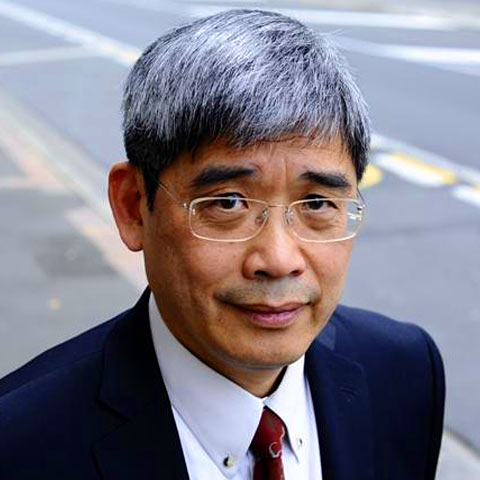Awardees of Egon and Ann Diczfalusy Foundation
Frederick CHUNG WEI WU MD PhD
/ frederick-chung-wei-wu /


THE DICZFALUSY AWARD
WINNER IN 2019
- Manchester, United Kingdom
- University of Manchester
professor emeritus of Medicine and Endocrinology
Laudation of Frederick Chung Wei Wu (2019, Prague)
Laudator: Prof. emeritus Dr. György Bártfai - MD and PhD at University of Szeged Hungary, and DSc. at the Hungarian Academy of Science. President of the Egon and Ann Diczfalusy Foundation
It is a great honour for me to introduce Professor Frederick Wu. I feel personally privileged and delighted to deliver his laudation for getting the Lifetime Scientific Award of the Egon and Ann Diczfalusy Foundation.
He was born in 1942 in Hong Kong. After finishing his college he moved to England for continuing his studies in Kingswood School of Bath and University of Edinburgh, Scotland where he graduated in medicine in 1970.
He reached many appointments in the UK, and he was a Senior Lecturer and Consultant Physician in his mother country, China (Hong Kong) as well. He had achieved many remarkable scientific recognitions in his fields of interest, namely in endocrinology and andrology.
His first appointments were at the University of Edinburgh where he did clinical and research work trough two decades. Afterwards his scientific career continued at the University of Manchester until his retirement.
As far as teaching is concerned: he held regular undergraduate and postgraduate courses at the University of Manchester. He was also a visiting professor in many places worldwide like Melbourne and Adelaide, Australia, Auckland, Wellington, New Zealand or in Boston, USA.
Other teaching activities:
He gives lectures regularly outside Manchester in the UK and abroad in postgraduate training courses organised by national and international societies, including but not limited to the following: International Society of Andrology, World Health Organisation, US Endocrine Society, Australian Socierty of Endocrinology, European Academy of Andrology, European Federation of Endocrine Societies, European Society for Human Reproduction and Embryology, Swiss Endocrine Society.
He has had many acknowledgements, awards and important positions in scientific societies.
Treasurer, International Society of Andrology, 1994 - 2001
Treasurer, International Society of Andrology, 1994 - 1997 and 1997 - 2001
He received the Egon Diczfalusy Lecture Medal, in Karolinska Institute, Stockholm, Sweden, in 1996. At the ceremony, Prof. Diczfalusy was present.
Member of the Executive Council, European Academy of Andrology, 1997 to 2013.
Chairman of Examination Committee for the Diploma for Clinical Andrology, European Academy of Andrology, 1997 –2006.
President, European Academy of Andrology, 2006 - 2010
He was chosen to the top doctors of Britain on the field of endocrinology by the Times Newspaper in November 2010.
Northern Communities Health Foundation Visiting Professorship, University of Adelaide, Australia 2013
He was given the The Distinguished Achievement Medal awarded to the Researcher of the Year 2013 in the Faculty of Medical and Human Sciences, University of Manchester (being nominated for his seminal research into the endocrinology of ageing, successfully coordinating the multi-national and multi-disciplinary European Male Ageing Study (EMAS) over the past 10 years and being at the forefront of investigating the importance of testosterone in elderly men). This was our huge common project while scientifically cooperating with a friend made things much easier.
He applied for numerous successful projects and grants.
Since taking up posts in Manchester, research grant funding totalling £18 million (sole and joint) from MRC, BBSRC, Wellcome, EC and WHO
The three most important projects were:
1. European Commission Framework Programme V – European Male Ageing Study: Prevalence, incidence and geographical distribution of symptoms of ageing in men and their endocrine, genetic and psychosocial correlated. €6,100,000 over 7.5 years. January 2002 to February 2010
2. World Health Organisation – Sperm suppression and contraceptive protection provided by norethisterone-enanthate plus testosterone undecanoate in normal men US $572,729 over 3.5 years - March 2008 to August 2012
3. Medical Research Council - National Survey in Sexual attitude and Lifestyle (NATSAL) 2010 with A Johnson, CH Mercer, K Wellings, W Macdowall, A Copas, P Sonnenberg, C Ison, £5.4 million for five years - August 2008 to July 2013
He published a huge number of articles: Selected Peer-reviewed Publications from over 350 in prominent journals like: J Clin Endocrinol Metab and New England Journal of Medicine.
This rich scientific biography can convince everyone that the Foundation made the right decision when it awarded Professor Frederick Wu the Lifetime Scientific Award - a miniature statue symbolizing freedom, selected by the founder, Professor Diczfalusy.
Lecture of the Prize-winner (2019)
Functional changes in the Hypothalamic-Pituitary-Testicular (HPT) axis in ageing men – longitudinal data from the European Male Ageing Study (EMAS)
Ageing is associated with multi-level alterations in the hypothalamic-pituitary-testicular (HPT) axis function affecting both the steroidogenic and gametogenic compartments. It is not clear how this aligns with the clinical scenario of symptomatic older men presenting with low or low normal testosterone (T). Whether the clinico-pathological constructs of hypogonadism, long established in young patients, can be translated to underpin the management of the burgeoning number of middle aged and older men being referred for possible androgen deficiency, is also uncertain.
I will present prospective follow-up data in the observational cohort of >3000 men from the European Male Ageing Study (EMAS), which describe the natural history of two divergent tracks of HPT axis dysfunctional that underlie the age-related decline in T, based on the physiological classification of hypogonadotrophic (secondary) or hypergondodotrophic (primary) ‘hypogonadism’.
The main findings are:- the vast majority of men in the general population men do not become hypogonadal during ageing. Obesity is associated with the development of sexual symptoms with chronic but reversible hypothalamic/pituitary suppression (equivalent to secondary ‘hypogonadism’) independent of age, usually affecting middle-aged rather than elderly men. In contrast, the less common equivalent of primary ‘hypogonadism’ found mainly in men over 70 yr of age show a more severe phenotype with sexual and physical symptoms, insulin resistance and co-morbidity compatible with either androgen deficiency or general health deterioration. It is also relatively common to encounter elevated LH with normal testosterone in ageing men - this can be considered to be a state of compensatory ‘eugonadism’ since they do not have definite features of androgen deficiency, but amongst them will be a small minority who eventually transitions to primary ‘hypogonadism’.
Our epidemiological study cannot clearly differentiate between the co-linear symptoms of androgen deficiency and the non-specific features of ageing-related disability or prove causality of clinical features resulting from low T. Nevertheless, our observational data are consistent with results from recent RCTs of T replacement in symptomatic older men with low T. Improved understanding of the aetiology, natural history and potential clinical significance of the age-related changes in the HPT axis can inform designs of future interventional trials and current clinical practice.